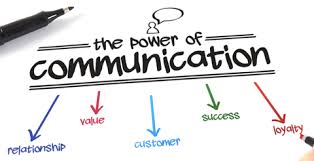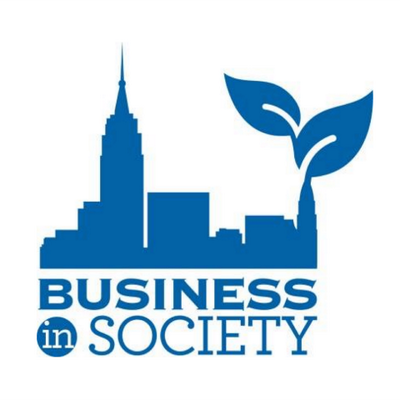
Business in Society: CSR, SD & Ethics
École des Ponts Business School’s code of ethical conduct
Introduction
In compliance with the values and reputation of Ecole des Ponts Business School, and in respect of its core values, this present code of ethical conduct has been elaborated to set the general principles to which every member of Ecole des Ponts Business School has to adhere and accept.
The ultimate goal of Ecole des Ponts Business School is to promote and maintain excellence and integrity through every action it undertakes.
This code constrains the whole École des Ponts Business School population (students and staff) to unite around our values: 1) Leverage business and technology to serve human progress across the globe; 2) Strive for individual and collective excellence; 3) Challenge conventional thinking [1];which serves not only its students but the world in which it exists.
The mission of École des Ponts Business School is to train ethical business leaders. The students and the staff are responsible for the added value to the learning program, and the respect of ethical rules in order to make the learning-centered environment successful. It’s crucial that students, professors and staff accept and commit on the following code of ethics.
Students Responsibilities
Our student code of ethics centers around three important thrusts: Integrity and intellectual honesty, Respectful behavior and respect of confidential and privacy. Integrity implicates student conduct in accomplishing the requirements of a course. Intellectual honesty involves student conduct while producing course assignments. Respectful behavior concerns behavior and attitude inside and outside the classroom.
All students taking classes in École des Ponts Business School are required to read and accept the terms of Our School Code of Ethics.
- Integrity and intellectual honesty
Ecole des Ponts Business School Student should have high values of integrity towards their academic activities.
The Business School is committed to providing support for all the students and to help them understand the expectations for academic integrity. This means that the students adhere to the academic integrity values.
The students are responsible for the understanding of the integrity in their assignments, work, papers, examinations and projects by avoiding academic misconduct, or plagiarism. They are also responsible of discouraging other students from any kind of academic misconduct.
An academic misconduct can be defined as one of the following behaviors: cheating, interference and plagiarism.
- Cheating is defined as fraud, or dishonesty in an academic context. It includes using or helping others in using materials that are forbidden or unsuitable in an academic assignment.
For instance: Copying or attempting to copy from others on an assignment. buying or exchanging an assessment task from an online website.
- Interference is referred to as the voluntary unfair obstruction that prevents
other students from accessing study resources or finishing their work
- Plagiarism[2] is presenting someone else’s work or ideas as your own, with or without their consent, by incorporating it into your work without full acknowledgement. All published and unpublished material, whether in manuscript, printed or electronic form, is covered under this definition.2 Students must properly acknowledge the source of information used in their papers, and should not re-use their own work without permission.
Academic integrity is the first step for achieving Ecole des Ponts Business School main values.It’s obvious that we cannot imagine at first hand, striving for individual and collective excellence and then leveraging business and technology to serve human progress across the globe, without this core academic value.
- Respectful behavior
Ecole des Ponts Business School students should adopt a respectful behavior conduct when they interact with their peers, professors, administration staff members and others.
Respectful behavior conduct includes ethical behavior, appropriate comportment and respect. The main directives of the respectful behavior exclude all kind of discriminations (race, Color, sex, origin, religion…). Within classrooms, students must abide by the following rules:
- Respect of the Schedule of the classes and courses (start and end)
- Avoid use of mobile phone inside the classes
- Avoid use of impolite language
- Avoid troublemaking behaviors
Respectful behavior enhances the collective and individual excellence. It makes students able to show more respect for others work and get the best of their differences in order to improve at first hand their own work and behavior and at the other hand make discussions more productive and innovative.
Respectful behavior conduct is expected in all classes.
Also, every member of the Ecole des Ponts Business School should respect their environmental integrity and social responsibility. Students must show excellence, respect, citizenship and work towards sustainability and environmental responsibility.
- Respect of confidential and privacy
Ecole des Ponts Business School students must protect privacy of other people with whom they cooperate or interact (Business school’s staff, students, professors, alumni and administrators). The students must convey respect and not divulge confidential or personal information.
Any use of personal or confidential information about the school staff, professors or other students, in social networks is forbidden. (Blogs, Facebook, Twitter, Tik Tok, Instagram etc.)
Students must report any violation of data privacy or improper behaviors, otherwise they can be considered as complicit in the concerned incident.
Finally, beside the three previews rules, each class can have its specific rules and policies about respectful behaviors. The rules will be defined and proposed by the professor or the class leader and submitted to all relevant members for approval and adherence.
Violation of code of ethics
The stakeholders (Professors, staff, administrators) of Ecole des Ponts Business School are responsible for handling all violations of the code of ethics in offices, classrooms and other school places and activities in which they are involved.
The professors can apply the following sanctions:
- Informal warning or Formal warning (oral or written)
- Force the work to be redone and resubmitted
- Force the student to complete additional work
- Reducing the grade of work in question or the overall grade in the course
- Recommend administrative leaving from the class
- Assigning “0” for the work in question or for the module
- Recommend the student be referred for business school disciplinary action
The professor is free the chose the most appropriate sanction when students violate the code of ethics.
A student who receives a sanction for violating this code of ethics may appeal to the Division Chair of the dean of the business School.
Staff Responsibilities
Ecole des Ponts Business School staff and faculty (professors, administrators shall:
- Honor and safeguard academic freedom by practicing integrity and intellectual honesty.
- Having a respectful behavior towards their colleagues
- Respecting the personal privacy of the students and the staff members.
- Act according to the school mission and in order to enhance school reputation and achieve its goals.
- Accept and adhere to national and international regulations
- Avoid any kind of discrimination of the students or the staff based on race, color, sex or religion
- Avoid any act of harassment or misconduct towards the staff or the students.
In order to leverage business and technology to serve human progress across the globe, the business school staff shall struggle to:
- Ensure and encouraging excellence in business and technology by promoting the continuous learning
- Create real proximity with students
- Empower students to adhere to the school values
- Promote research using new ways of thinking
- Make necessary effort to make student adopt respectful and honest conduct by promoting and demonstrating respect towards students
- Be law-abiding citizens
Excellence is a fundamental value of the Ecole des Ponts business school. To achieve that, professors and researchers shall strive to:
- To be updated in the business school expertise fields
- To be informed about the global environment
- Apply the ethical code and values in all the research and produced work and papers
- To not use students or their work for private benefit
In their daily interactions, staff and students shall:
- Be Objective and respectful
- Be Civilized and open minded
- Accept their responsibilities and duties toward the students and the school
Finally, the school community should act
according to this code of ethics in order to promote individual and collective
excellence, new ways of thinking and to prepare the new generation of ethical
managers and leaders.
References
Code of Ethics: Statement on scholastic dishonesty. (January, 2019) McCombs School of Business, The University of Texas at Austin. Retrieved from https://my.mccombs.utexas.edu/BBA/Code-of-Ethics
Code of Ethics. (January, 2019) Toulouse Business School, Retrieved from http://www.tbs-education.fr/en/toulouse-business-school/social-responsibility-and-sustainable-development/code-ethics
Ethics and Honor Code. (January 2019) Board of Regents of the University of Wisconsin System. Retrieved from https://bus.wisc.edu/current-student-resources/ethics-honor-code
NWOSU Code of Ethics. (January 2019). Northwestern Oklahoma State University. Retrieved from https://www.nwosu.edu/school-of-professional-studies/business/code-of-ethics
About PRME: The 6 Principles. (2019, January). Retrieved from http://www.unprme.org/about-prme/the-six-principles.php
École des Ponts Business School’s Social project
Introduction
As the world evolves towards modern technology and advancement, resources get scarcer and scarcer thus emphasizing the gap between those who have and those who have not. Poverty is defined as “the scarcity or the lack of a certain (variant) amount of material possessions or money”[3]. (Merriam-Webster, 2019). In its global understanding, Poverty is also referred to as a multifaceted concept that involves social, economic and political dimensions. Indeed, absolute poverty describes a situation where even the individual lacks the means necessary to meet with basic needs as defined in the Pyramid of Maslow (food, clothing and shelter)[4]. Since poverty impedes one’s basic right to live properly, it has become one major issue targeted by many organizations such as the World Bank of the United Nations. These organizations are committed to fighting poverty in all its dimensions. While the World Bank Group’s mission is to free the World from poverty, many initiatives have been undertaken on an International, National and Regional levels to reduce poverty or creating opportunities of wealth in the most precarious regions of the Globe.
Poverty is not being able to afford the car of the house we wish for, poverty implies surviving each day without not knowing if one would ‘afford’ to live another day, and this definition of poverty has several implications to it. To overcome poverty, people and nations, might turn to unsustainable and detrimental actions on an environmental level. Indeed, the poor who needs to find a mean of subsistence combined to the State who relies on exports to alleviate debt, ultimately lead to an overexploitation of natural resources, including water, forests, fisheries, soils etc.… Lands that are ecologically fragile and unsuitable for agriculture are subject to intensive cultivation and overgrazing. This leads to soil erosion, depletion of water resources, lower yields for crops and ultimately, to desertification. Also, often when poor women and children spend hours per day fetching water and firewood, time and energy that would be better spend at school, doing community development and establishing good family relations. Land degradation and poverty in rural areas encourage mass migration to already overcrowded urban areas where lack of safe water, infrastructure, sanitation and public services contribute to the emergence of diseases, water pollution, criminality and social tensions.
Developing countries suffer from ecological problems – such as global warming and ozone depletion – that have so far been largely caused by the economic activities of developed countries. Also, poor countries lack the financial resources to move to more environmentally sound technologies that are more expensive and adopt sustainable development practices. In addition to the ecological and humanitarian bill, poverty contributes to social tensions, political instability and armed conflict within those same regions. For all these reasons, poverty is a global concern that involves everyone.
Aware of its role as a nourishing university and faithful to its motto Alma Mater Studiorum, Ecole des Ponts Business School, since its creation, has strove to deliver and nurture managers and worlds’ leaders. At its beginning, our school has participated in the training of civil engineers in order to build bridges and roads thus, connecting the world. The same spirit has been preserved in a business level with the business school. Our main objective is to deliver business leaders that work on constructing the infrastructure and opportunities to modern businesses. Indeed, Ecole de Ponts Business School encourages and supports its students in developing capabilities that will enable them to generate sustainable value for business and society. Ecole des Ponts Business School is very faithful to PRME principles that include values, method, research, partnership and dialogue. Since its establishment in Morocco, in the recent years, Ecole des Ponts Business School has maintained its involvement within its ecosystem and environment. With a focus on the Moroccan region, Ecole des Ponts Business School is building a network of prestigious alumni that are working on reducing the gaps and inputting wealth and value in the Moroccan society.
Morocco is considered a developing country with a population exceeding 35 million people. About three quarters of poor people in the country live in rural areas. Under Morocco’s ambitious National Initiative for Human Development the poverty rate fell from 14 per cent in 2004 to 6.2 per cent in 2011[5].
In their last report Poverty in Morocco: challenges and opportunities, the World Bank and the Haut Commissariat au Plan shows that although Morocco has experienced an improvement in its standard of living and a combined decline in poverty and vulnerability between 2001 and 2014, subjective poverty remains at a high level, especially in rural areas[6].
The following chart indicates regions with highest rural poverty level:
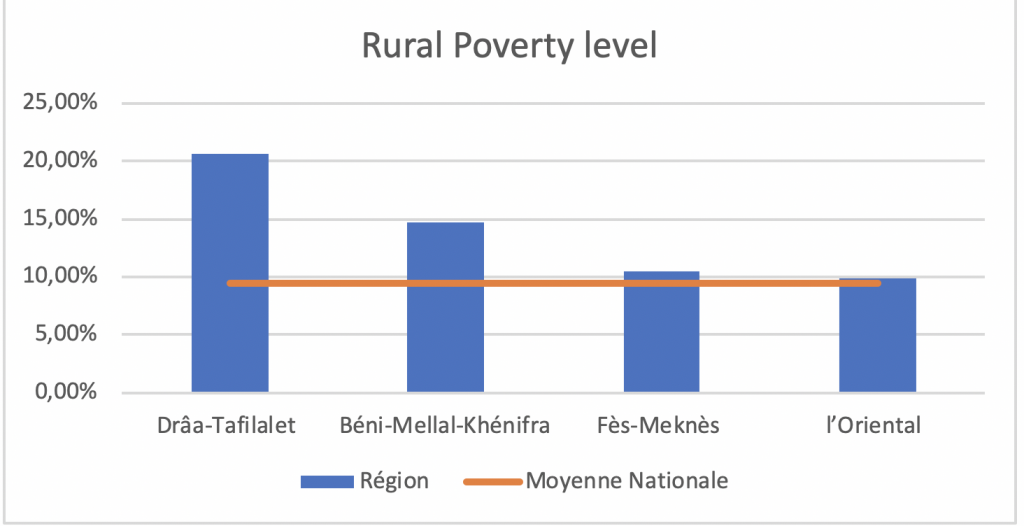
The chart below shows that more than 50% of the poorest population is illiterate, especially in the rural areas, and more than half of the rural population consider themselves as poor.
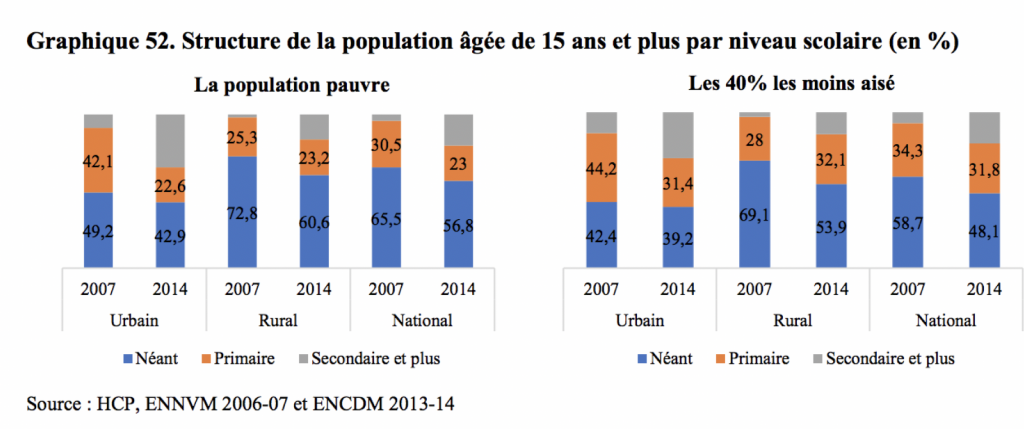
As stated, poverty can have several negative impacts on world population and societies such as poor healthcare, lack of education, terrorism, criminality, hunger etc… Ending or reducing poverty in all its forms everywhere is the first goal of sustainable development goals. That is why we choose to focus on Morocco poverty problems and more especially in Azizal which is one of the poorest rural regions in Morocco. Azilal overpasses 450.000 inhabitants. Its population is spread over 42 small rural villages which creates average income disparity depending on the local activity. The main income-generating activities of the 75000-family based in Azilal are: Agriculture, handicraft activities and pottery and ceramics. This region presents a high economic potential, despite a predominantly agricultural activity and a low rate of illiteracy. The idea behind the following project is to serve the region in terms of structure, values, method and research so they can make local small businesses evolve and produce more added value. By deploying this project, Ecole des Ponts Business School will achieve its social responsibility but also will have in-fields research projects for its students, will continuously refine its academic expertise and sow its reputation as a nourishing university.
Introducing the project
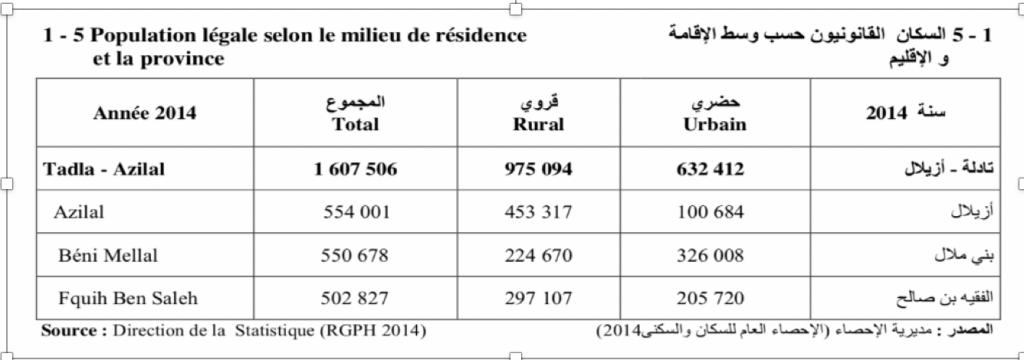

[7][8]Our project is to build a series of workshop women form cooperatives can benefit from. Indeed, Azilal is the core the Tadla-Azila region concentrating 50% of the regional population. By targeting the city of Azilal, we target the major concentration of the active population of the region.
The
city of Azilal and its economic activity is mainly based on handicrafts that
are still very traditional and precarious. Indeed, the region is full of
talents, women who have a unique but very traditional knowledge. We will focus
on women in this project as it represents a large part of the labor force and
whose status remains the most precarious in this region. In 2014, the Office of
the High Commissioner for Planning identified the sector of activity of these
local businesses.
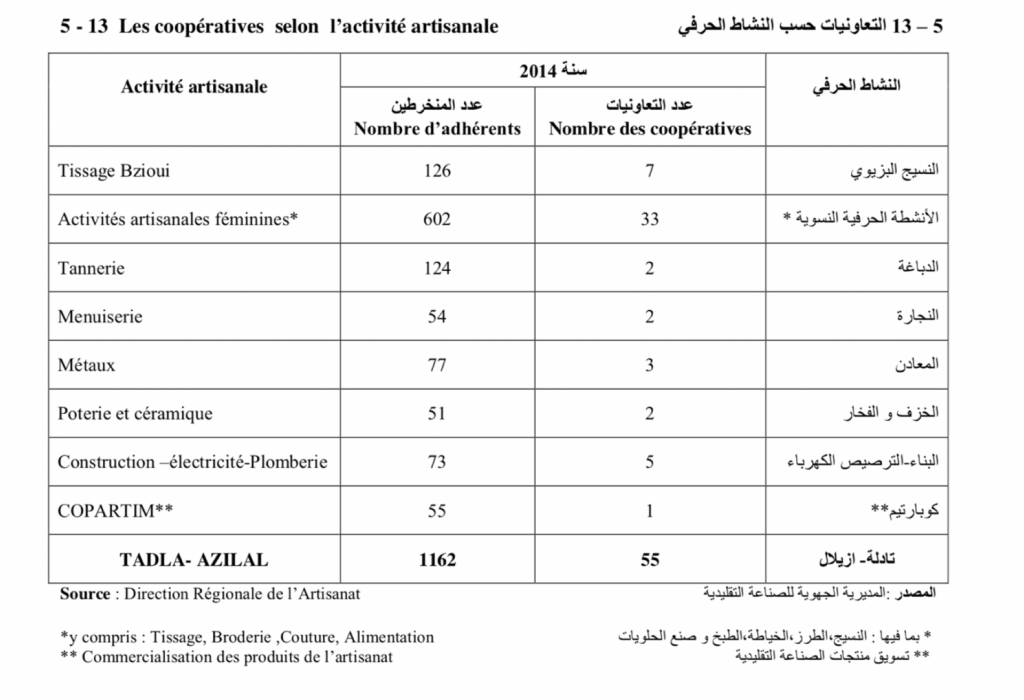
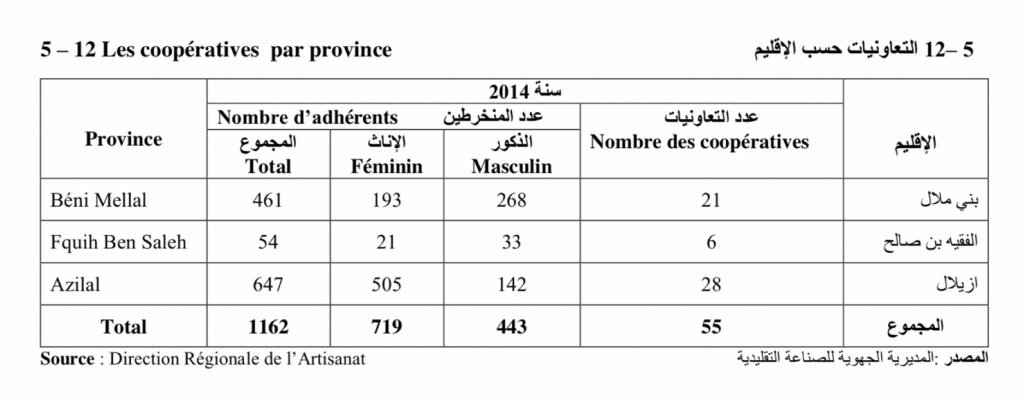
Thanks to its excellent academic reputation and relying on its faculty, the Ecole des Ponts Business School can provide expertise in the development of workshop content, academic coaching, monitoring and methodological support to enable these women to transition to a more innovative, modern business model that allows them to optimize their process and increase their wealth. Yet, the idea is to partner with a local NGO to achieve this goal.
Our Partner : SENMID Association for Social Development
The SENMID Association for Sustainable Development is a regional association fighting against poverty and precariousness in the Azilal region. Created in 2016, at the initiative of the leaders of the region, this association organizes training and awareness campaigns to the people of the Azilal. She also organizes medical caravans and food donations for the neediest families.
The partnership axes and objectives
The main axes of the partnership
Under
the patronage of INDH, a national initiative, the partnership between Ecole des
Ponts and SENMID will focus on the implementation of these training programs
dedicated to rural women. SENMID will oversee the logistics implementation of
the training: Beneficiaries database, data collection, presence management,
activity monitoring. The School of Bridges will provide the necessary academic
resources: trainers, course contents, supports, studies of existing processes
and proposal for improvement as well as monitoring.
Partnership and PRiME
This social project serves the 6 PRIME principles:
- Purpose: This project delivers a double purpose: it helps reduce poverty through the establishment of modern, added-value process in traditional businesses, but it also enables the students involved in the project refine their skills. By working on challenging business cases and models, they will work on real-time environments, strengths and opportunities.
- : This project embodies the values of global social responsibility in the sense that it works directly on the global Millennium Objectives set by the UN empower women in the MENA Region and Africa.
- The project committee will propose educational frameworks, material, and processes to women benefiting from those workshops. The material will be targeted according to their needs, lacks and required skills. It will also be in darija and tifinagh so it can access the targeted audience.
- Thanks to the data collection that will be led by our partner we will engage in conceptual and empirical research that will advance our understanding of the region, the role of the businesses, how to enhance the commercialization of local handicraft, and how to optimize local resources for more added-value to the businesses.
- Partnership: the idea of getting a local partner who owns the same values is to extend our knowledge and get a local expertise of their challenges. Indeed, SENMID had been working over the last decade on on-field situations where they had to meet with social and environmental issues. By exploring this project together, we will approach the issue of increasing value of local business more efficiently.
- Dialogue: We will facilitate and support dialog and debate among trainers, students, businesses, consumers, civil society organizations and other interested groups and stakeholders on critical issues related to social responsibility and sustainability.
Social impact, and its measurement
The National Initiative for Human Development (INDH), launched by His Majesty the King Mohammed VI, on May 18th, 2005, is fighting against poverty, precariousness and social exclusion through the realization of basic infrastructure projects, training and capacity building, social and cultural animation, sports actions as well as the promotion of income and jobs generating activities. Building on this action, the project ‘Modernizing Local Businesses’ that we propose, aims at establishing a regular, targeted seminar cycles to the benefit of local women business owners. These women usually work in handicraft and generate a limited revenue for their households and the region. This project relies on:
- Providing a legal and administrative, user-friendly structure and processes to their businesses in order to modernize the structure;
- Providing a solid training in soft-skills and basic business practices;
- Providing basics in commercialization, marketing and selling techniques;
- Providing an optimized structure to local production;
- Provide techniques on fund-raising and accounting;
- Leading a local study on market tendencies and SWOT analysis of the targeted businesses;
- Providing a list of recommendations to the seminar beneficiaries;
- Providing KPI measures for the impact of the project.
Through this project, Ecole des Ponts Business Schools, and their partners, aim at impacting directly the sources of revenues of at least 30 households, thus generating wealth and labor for the region. Also, theses seminars will benefit less-educated women to modern practices of business and awareness thus, achieving sustainability. Indeed, when educating women, one impacts the whole household. A self-aware and empowered woman will raise more educated children encouraging their academic education. By transitioning to a more modern business model, more services are created thus, creating more job opportunities creating a vicious circle. If the project succeeds, then we can extend the experience to other sectors of activities and more beneficiaries through new partnerships with local NGO’s.
The budget
Based on the previous data and target (the use of students as main actors), our macro estimation is 100000 DHs.
References
About PRME: The 6 Principles. (2019, January). Retrieved from http://www.unprme.org/about-prme/the-six-principles.php
«Annuaire de la région Tadla-Azilal 2015 (2017, June) Haut-Comissariat au Plan, Retrieved from http://www.hcp.ma/region-drta/docs/Publications/Annuaire%20Statistique%20de%20la%20r%20gion%20%20Tadla-Azilal%20%202015.pdf
“Azilal Province: Royal Constant Action to Improve Living Conditions of Local Population” (2014, May 24th) Moroccan Ministry of Culture and Communication. Retrieved from http://www.maroc.ma/en/royal-activities/azilal-province-royal-constant-action-improve-living-conditions-local-population
Morocco (2019, January) International Fund for Agricultural Development. Retrieved from https://www.ifad.org/en/web/operations/country/id/morocco
United Nations Educational, Scientific and Cultural Organization (2019) Retrieved from: www.unesco.org. January 2019
The World Bank (2018, April 9th). Poverty in Morocco: Challenges and opportunities. Retrieved from https://www.worldbank.org/en/country/morocco/publication/poverty-in-morocco-challenges-and-opportunities
Pauvreté et Prospérité
partagée au Maroc du 3ème millénaire, 2001-2004 (2017, Novembre) Haut-Comissariat au Plan, Retrieved from http://documents.worldbank.org/curated/en/806431523250621639/pdf/125040-WP-FRENCH-PUBLIC-Pauvret%C3%A9-et-prosp%C3%A9rit%C3%A9-partag%C3%A9e-FINAL.pdf
[1] Ecole des Ponts Business School’s values, 2019. Retrieved from: https://pontsbschool.com/about-the-school/
[2] Plagiarism (Definition), University of Oxford. Retrieved January 2019, from https://www.ox.ac.uk/students/academic/guidance/skills/plagiarism?wssl=1
[3] Definition of Poverty (2019) Retrieved from https://www.merriam-webster.com/dictionary/poverty
[4] United Nations Educational, Scientific and Cultural Organization (2019) Retrieved from: www.unesco.org. January 2019
[5] Morocco (2019, January) International Fund for Agricultural Development. Retrieved from https://www.ifad.org/en/web/operations/country/id/morocco
[6] The World Bank (2018, April 9th). Poverty in Morocco: Challenges and opportunities. Retrieved from https://www.worldbank.org/en/country/morocco/publication/poverty-in-morocco-challenges-and-opportunities
[7] Population of the Tadla-Azila Province (2014)


